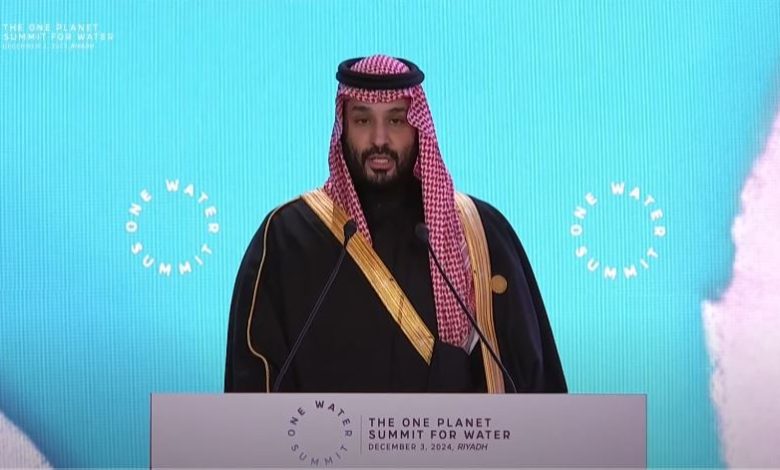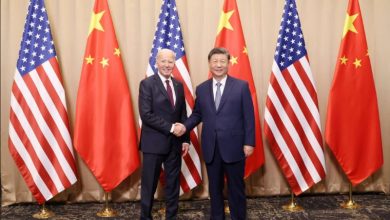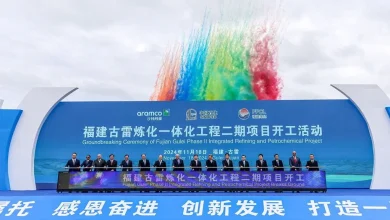‘One Water Summit’ for Sustainability of Water Resources

-
Riyadh Hosts ‘One Water Summit’ to Enhance Sustainability of Water Resources
-
Kingdom had contributed $6 billion in supporting 200 water-related projects in more than 60 developing countries around the world: Crown Prince Mohammed bin Salman
-
Saudi Arabia to Host World Water Forum 2027 Says Crown Prince Mohammed bin Salman
By: Muhammad Arif, Editor NSN.Asia
- Riyadh: Saudi Arabia on Tuesday hosted ‘One Water Summit’ in the capital city, Riyadh, to address the global scarcity of water resources and the related challenges.
The One Water Summit is being held alongside the 16th session of the Conference of the Parties (COP16) of the United Nations Convention to Combat Desertification (UNCCD).
The summit is an initiative led by Saudi Arabia in partnership with France, Kazakhstan, and the World Bank to discuss global water scarcity.

Speakers attending the summit underscored Saudi Arabia’s pioneering international role in confronting water challenges across the world and its commitment to sustainable environmental issues.
They discussed efforts to combat desertification, exchanging expertise and innovative technologies, and enhancing research and development to address water challenges and ensure the sustainability of water resources.
Alongside the summit, the crown prince also met with Gurbanguly Berdimuhamedow, Chairman of the People’s Council of Turkmenistan, Kassym-Jomart Tokayev, President of Kazakhstan, Luvsannamsrain Oyun-Erdene, Prime Minister of Mongolia, Shehbaz Sharif, Prime Minister of Pakistan, and Ajaypal Singh Banga, President of the World Bank Group.
The meetings of global leaders revolved around bilateral relations, joint coordination to address environmental challenges related to water scarcity and drought, in addition to issues of mutual interest.
Saudi Arabia’s Crown Prince Mohammed bin Salman during his opening remarks, said the summit was being held in conjunction with the Kingdom hosting the 16th Conference of the Parties to the UN Convention to Combat Desertification, which aims to reduce land degradation and drought.

He said that the Kingdom had contributed $6 billion in supporting 200 water-related projects in more than 60 developing countries around the world.
Prince Mohammed also confirmed Saudi Arabia preparing to host World Water Forum 2027.
The world is facing mounting challenges in the water sector, including rising drought rates that lead to multiple crises represented by a shortage of usable water, the exacerbation of desertification, and the subsequent threat to human life and societies, said MBS
According to the Saudi Press Agency, he called on UN member states and international private sector organizations to join the World Water Organization that the Kingdom will establish to develop and integrate efforts to address water challenges.
The crown prince expressed his hope that the efforts of the international community to address water challenges will contribute to achieving the goals to which all aspire.
Governments must create a clear vision and policy framework to address the urgent need for land and water preservation, said Saudi Arabia’s Minister of Investment Khalid Al-Falih during a key ministerial dialogue at COP16.
The session, titled “Unlocking Public and Private Finance for Land Restoration and Drought Resilience,” focused on the global imperative to tackle issues that cost the global economy $10 trillion annually.
Al-Falih highlighted that Saudi Arabia has already incorporated sustainable land management into its Vision 2030 framework, with specific policies aimed at safeguarding natural resources.
“Our vision explicitly sets out policies around how to manage our water and our land sustainably,” he said.
“In Saudi Arabia, we have launched the Saudi Green Initiative, which aims to plant 10 billion trees and rehabilitate 40 million hectares of degraded land,” Al-Falih said.
He urged governments globally to adopt similar approaches to drive environmental sustainability.
Ibrahim Thiaw, executive secretary of the UN Convention to Combat Desertification, emphasized that the world must invest $1 billion daily to achieve land restoration goals by 2030.
He stressed the growing pressure on land and global food systems, noting that up to 40 percent of the world’s land is already degraded.
“It is estimated that by 2050, we will have to produce two times more food than the amounts we produce now,” Thiaw said, while pointing to the $2.6 trillion spent annually on harmful environmental subsidies.
“The main issue here is, how can we repurpose our investments? How can we rearrange our resources so that we channel them toward positive outcomes rather than negative ones?” he said.
Despite the enormity of the challenge, Thiaw expressed optimism, emphasizing the availability of solutions for land restoration. “Land restoration has several benefits for public health, the economy, and people worldwide,” he added.
Thiaw also underscored the importance of both public and private finance in bridging funding gaps, citing tools like green bonds and impact investing.
He added that “this investment should be considered an investment into our future for our children and grandchildren.”
Achim Steiner, administrator of the UN Development Program, said “Public finance must de-risk investment in regenerative agriculture and ecosystem restoration, as it did for renewable energy projects 15 years ago,”, noting that such de-risking strategies have helped attract $2 trillion in annual investments for renewable energy.
Al-Jasser outlined the IsDB’s efforts, including $5 billion in green sukuk since 2019 and over $6 billion in public sector financing for UNCCD-aligned projects, supporting initiatives in water infrastructure, climate-resilient agriculture, and soil conservation.
The IsDB president outlined the bank’s significant financial commitments to tackling these challenges, highlighting support for initiatives such as water infrastructure, climate-resilient agriculture, and soil conservation programs launched since 2018.
OPEC Fund President Abdulhamid Al-Khalifa announced a $1 billion commitment to the Riyadh Global Drought Resilience Partnership. He also highlighted the organization’s ongoing push to allocate 40 percent of its financing to climate action by 2030. “In 2023, we already achieved 34 percent,” Al-Khalifa noted, stressing that such commitments are crucial for mobilizing additional resources globally.

Mahmoud Mohieldin, UN Special Envoy on Financing the 2030 Agenda, emphasized the need to limit global warming to 1.5 C to mitigate the severity of droughts.
He reiterated the critical role land plays in climate action, noting that land degradation is the primary cause of biodiversity loss.
“Half of all climate actions are related to land according to the World Bank Group, and land degradation is the single greatest cause of biodiversity loss according to the UNCCD secretariat,” Mohieldin said, going on to emphasize the strong interconnections among the 17 goals, noting that five of these directly address the critical role of land.





